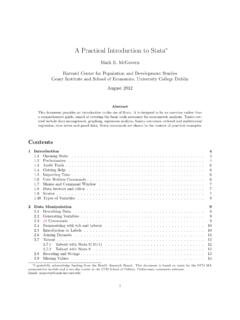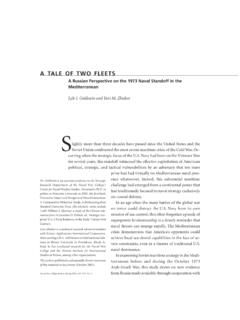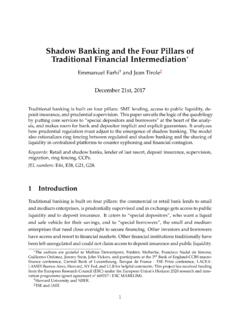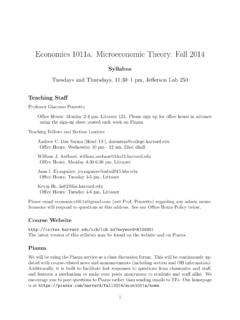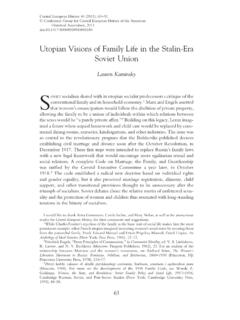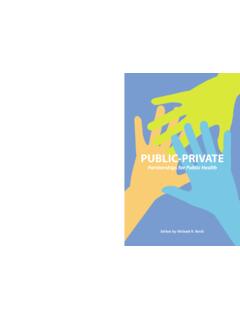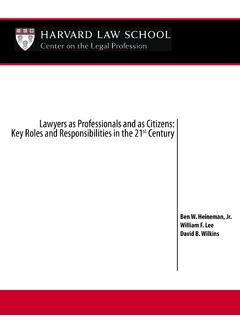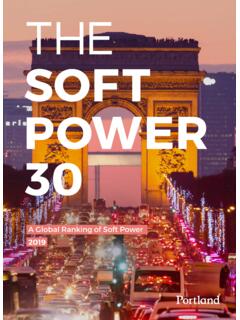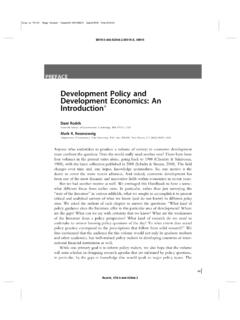Transcription of Policy Paradigms, Social Learning ... - Harvard University
1 Policy Paradigms, Social Learning , and the State: The Case of Economic Policymaking inBritainAuthor(s): Peter A. HallSource: Comparative Politics, Vol. 25, No. 3 (Apr., 1993), pp. 275-296 Published by: Program in Political Science of the City University of New YorkStable URL: : 12/06/2010 07:29 Your use of the JSTOR archive indicates your acceptance of JSTOR's Terms and Conditions of Use, available JSTOR's Terms and Conditions of Use provides, in part, that unlessyou have obtained prior permission, you may not download an entire issue of a journal or multiple copies of articles, and youmay use content in the JSTOR archive only for your personal, non-commercial contact the publisher regarding any further use of this work. Publisher contact information may be obtained copy of any part of a JSTOR transmission must contain the same copyright notice that appears on the screen or printedpage of such is a not-for-profit service that helps scholars, researchers, and students discover, use, and build upon a wide range ofcontent in a trusted digital archive.
2 We use information technology and tools to increase productivity and facilitate new formsof scholarship. For more information about JSTOR, please contact Program in Political Science of the City University of New York is collaborating with JSTOR to digitize,preserve and extend access to Comparative Paradigms, Social Learning , and the State The Case of Economic Policymaking in Britain Peter A. Hall The study of comparative politics has been heavily influenced over the past decade by theories of the state. Initially developed by neo-Marxists in response to the persistence of capitalism, such theories now take a variety of forms.' Their central contention is that the state, broadly understood as the executive, legislative, and judicial apparatus of the nation, has an important impact of its own on the nature of public Policy and considerable independence from organized Social interests and the electoral coalitions that might otherwise be said to drive Policy .
3 In the words of one state theorist, Policy should not be seen as "a vector diagram in which a series of pressures are brought to bear on the state, which then moves in the direction it is pushed by the strongest societal forces."2 In this respect, theories of the state offer a useful, if occasionally overstated, corrective to pluralist emphases on the societal sources of However, all research programs leave some questions unanswered, and this one poses particularly difficult ones. What motivates the actions of the state, if it is not the factors previously identified by pluralist analysis? How are we to conceive of the Policy process if not as a response to societal pressure? In this regard, the negative force of the state theorists' case against more traditional lines of thought has not been matched by their positive attempts to construct an alternative conception of policymaking. To suggest that policymakers respond instead to the "national interest" leaves us wondering how this national interest comes to be Similarly, to argue that Policy reflects a "parallelogram of preferences" among public officials themselves or the outcome of a "bureaucratic politics" in which "where you stand depends on where you sit" imports a rather underspecified model of pluralism back into the state Even the argument that " Policy legacies" determine the course of subsequent Policy raises questions about why some legacies are more influential than The recent work that focuses our attention on the state has been of great value, but the state at which we are now looking largely remains a black In the face of this dilemma, theorists of the state have been casting about for an alternative conception of the Policy process with which to complete their account of Policy .
4 Out of these endeavors, one concept has begun to appear with particular frequency. That is the concept of policymaking as Social Learning . The notion of politics as Learning has origins in work on cybernetics and organization theory, and psychologically oriented versions of it have been applied with some success to the process of foreign However, the formulation that has had the most influence on theories of the state is the one presented in Hugh Heclo's distinguished study of Social policymaking in Britain and Sweden. In Heclo's words: "Politics finds its sources not only in power but also in uncertainty-men collectively wondering what to do.. Governments not only ' power ' .. they also puzzle. 275 Comparative Politics April 1993 Policy -making is a form of collective puzzlement on society's behalf.. Much political interaction has constituted a process of Social Learning expressed through Policy ."9 There is a profound insight here, and it has been taken up with enthusiasm by theorists of the state.
5 In an influential review essay, Theda Skocpol observes that Heclo's work "suggests how to locate and analyze autonomous state contributions to Policy -making, even within constitutional polities nominally directed by legislatures and electoral parties," and Paul Sacks argues that "the 'politics as Learning ' approach implies that elements within the state, acting, presumably, in pursuit of the national interest, decide what to do without serious opposition from external actors," thereby confirming a central tenet of state theory.' The notion of Social Learning is on the verge of becoming a key element in contemporary theories of the state and of policymaking more generally. However, there are two major problems with the concept of Social Learning as hitherto employed by theorists of the state. First, it has been presented in only the sketchiest of terms. Unlike the psychologically oriented versions of Learning theory that have been explored more fully in studies of foreign Policy and the procedurally oriented versions presented by organization theorists, the concept of Social Learning presented by Heclo and taken up by theorists of the state emphasizes the role of ideas in policymaking.
6 But those who use the concept have yet to develop an overarching image of the way in which ideas fit into the Policy process or a clear conception of how those ideas might change. Second, it is not at all clear that the process of Social Learning actually accords as completely as many think with the notion of an autonomous state. Social Learning has generally been treated as a dimension of policymaking that confirms the autonomy of the state, but it may well be a process that is intimately affected by societal developments rather than one that takes place largely inside the state itself. This point speaks to a central division within current analyses of the state. Recent theories of the state can be divided into two types. On one side is a set of analyses that might be described as state-centric in that they emphasize the autonomy of the state from societal pressure. These works suggest that Policy is generally made by public officials operating with considerable independence from organizations like interest groups and political parties that transmit societal demands.
7 " On the other side is a range of theories that might be called state-structural. They, too, emphasize the impact on Policy of the state's structure and its actions, but they are less inclined to insist on the autonomy of the state vis-A-vis societal pressure. Instead, they accord interest groups, political parties, and other actors outside the state an important role in the Policy process. Their main point is that the structure and past activities of the state often affect the nature or force of the demands that these actors If Social Learning is a process that takes place largely inside the state itself, it will accord well with the arguments of state-centric theorists. However, to the extent that Social Learning involves much broader participation and conflict within the political system as a whole, it will be more consonant with the state-structuralist approach. The object of this article is to examine the nature of Social Learning and the more general process whereby policies change with a view to resolving some of these issues.
8 At the outset, I take up a number of questions about how the Learning process proceeds and attempt to specify more fully the roles that ideas play in policymaking. I then test the central propositions of the conventional Learning model and my expanded version against a series of cases of different kinds of Policy change, with the following questions in mind. How should 276 Peter A. Hall we understand the relationship between ideas and policymaking? How do the ideas behind Policy change course? Is the process of Social Learning relatively incremental, as organization theory might lead us to expect, or marked by upheaval and the kind of "punctuated equilibrium" that often applies more generally to political change.'3 Are bureaucrats the principal actors in Social Learning , or do politicians and societal organizations also play a role? Finally, I explore the implications of these cases for state-society relations with particular attention to the relationship between Social Learning and the autonomy of the state.
9 The cases that this article examines are all drawn from a specific empirical setting, namely, that of macroeconomic policymaking in Britain between 1970 and 1989. A broad concept such as Social Learning deserves to be explored in many contexts; no single case can fully resolve these issues. However, the setting of macroeconomic policymaking in Britain is an ideal one against which to test the prevailing conceptions of Social Learning and their implications for state theory. On the one hand, economic policymaking is a knowledge-intensive process, long associated with concepts of Learning . As Heclo observes: "Nowhere is the importance of such Learning and alteration of perspective more clearly demonstrated than in the economic doctrines prevalent in any given period."14 On the other hand, economic policymaking in Britain figures heavily in the most prominent attempts by state theorists to apply the concept of Learning .
10 '5 It also provides excellent cases against which to test state-centric arguments that the Learning process is dominated by officials and highly placed experts, since the power of official experts should be at its maximum in a highly technical field like macroeconomic policymaking and in nations like Britain that have unusually hierarchical and closed bureaucracies. The Process of Social Learning We can begin from what might be termed the prevailing model of Social Learning as utilized by contemporary theorists of the state. It is heavily based on Heclo's work, but the state theorists take his cautious formulations somewhat farther. The image of Learning that they present has three central features. First, they suggest that one of the principal factors affecting Policy at time-1 is Policy at time-0. In Sacks' words: "The most important influence in this Learning is previous Policy itself."16 Policy responds less directly to Social and economic conditions than it does to the consequences of past Policy .

